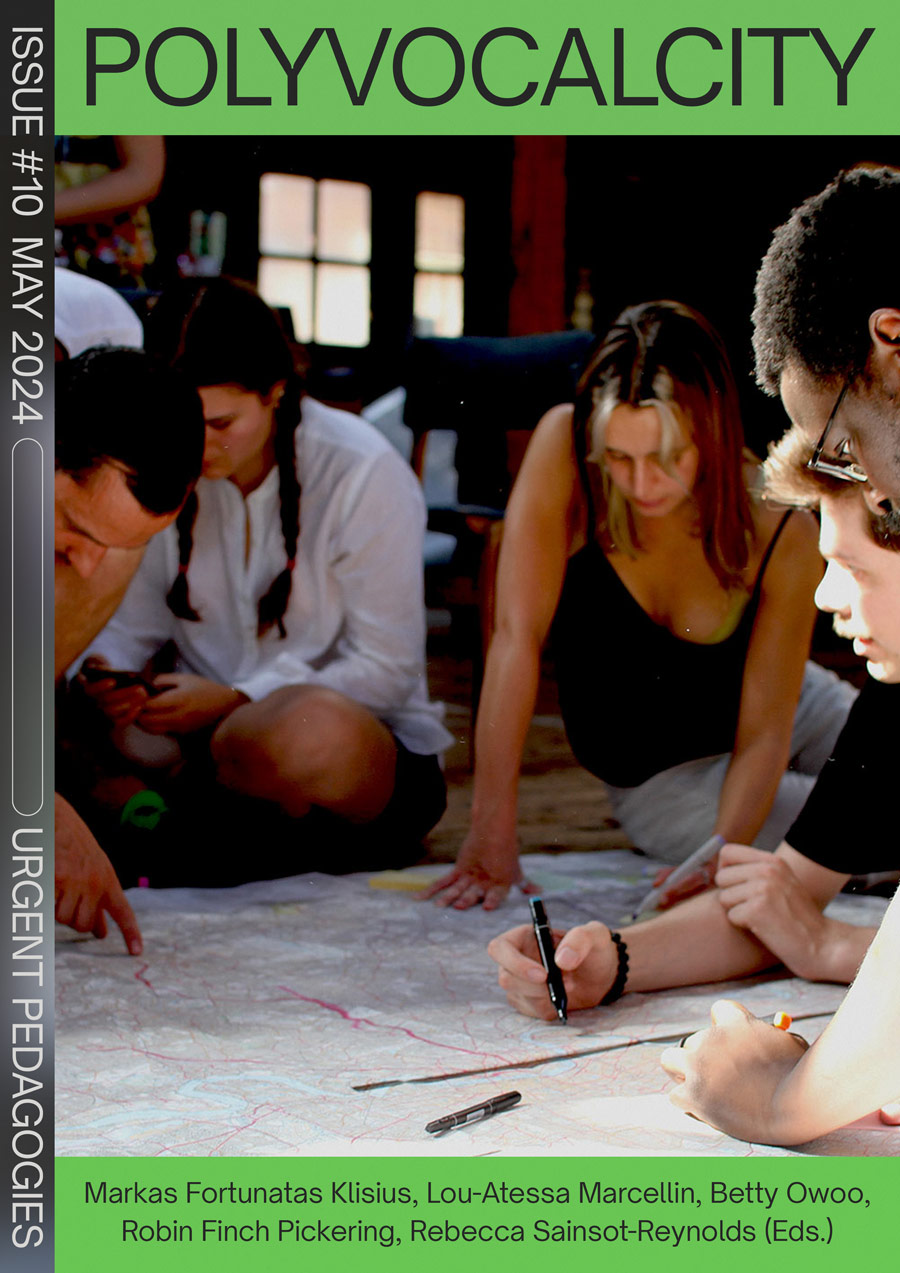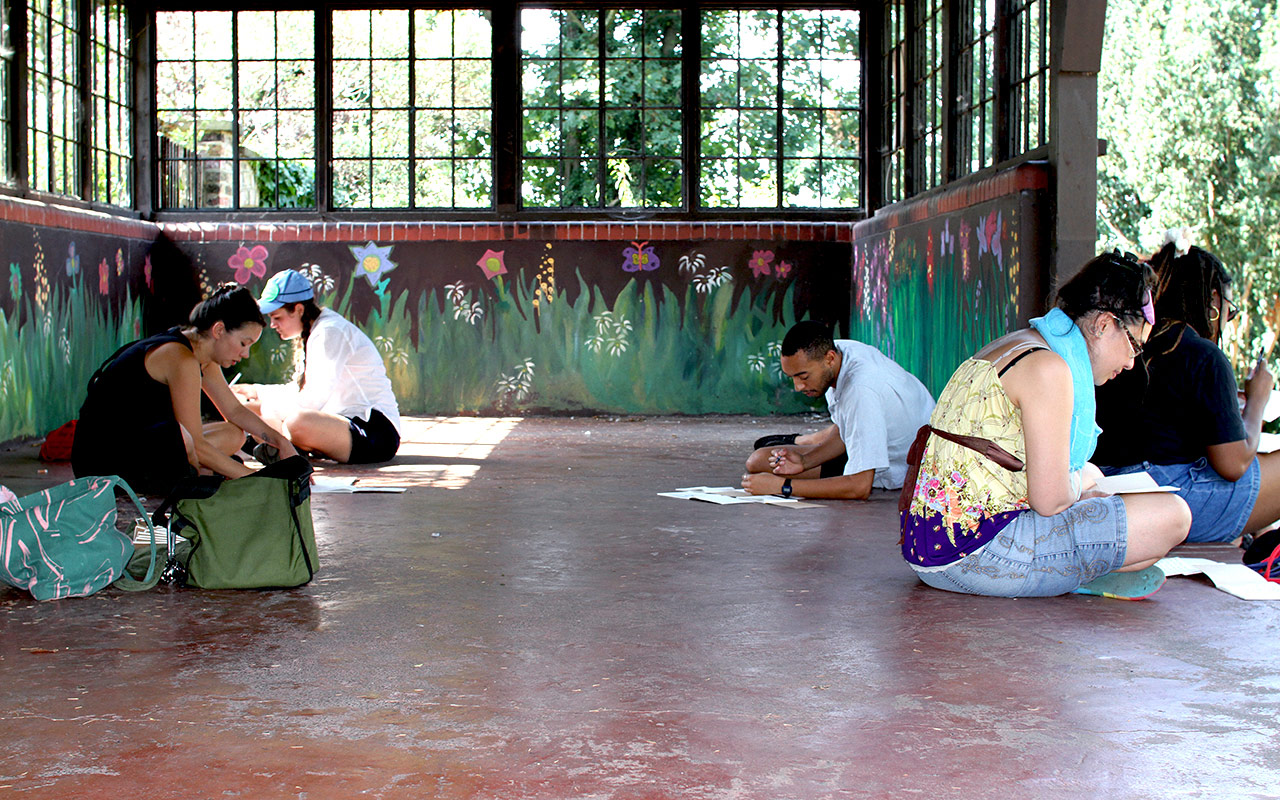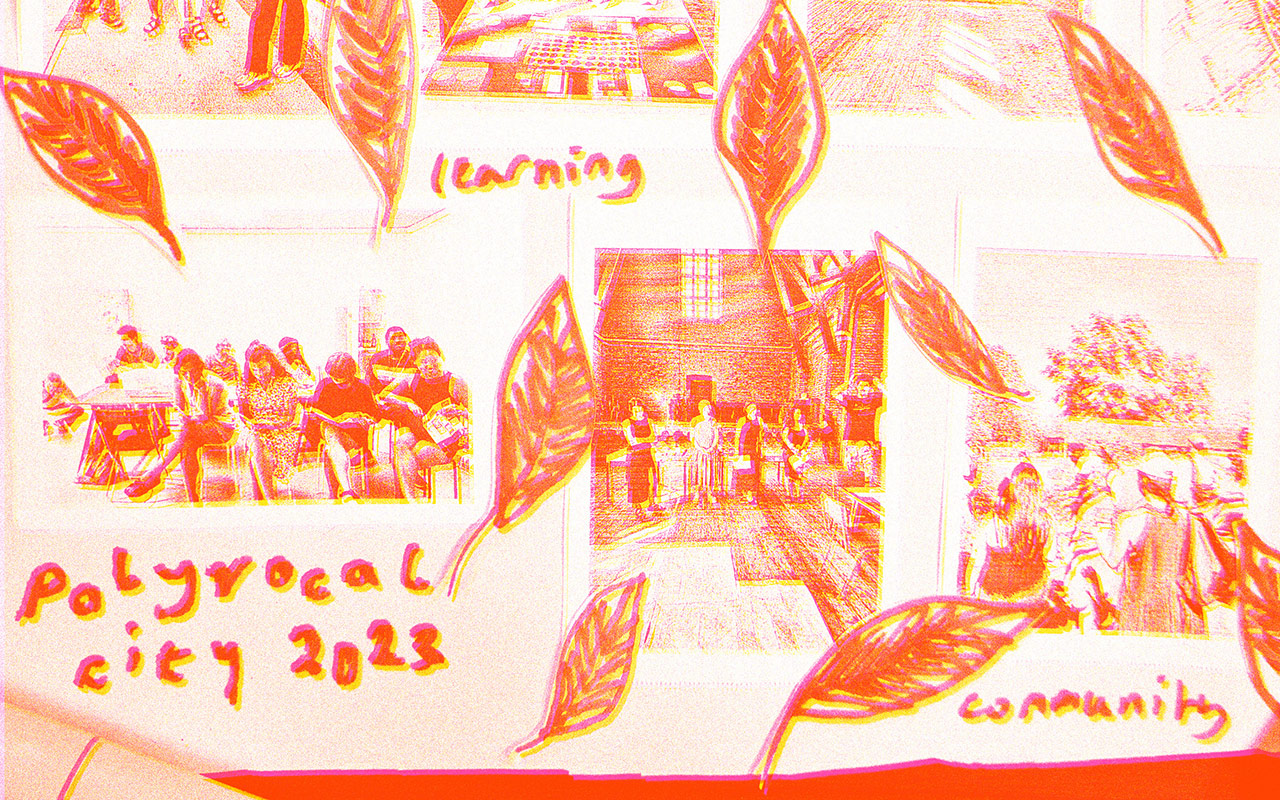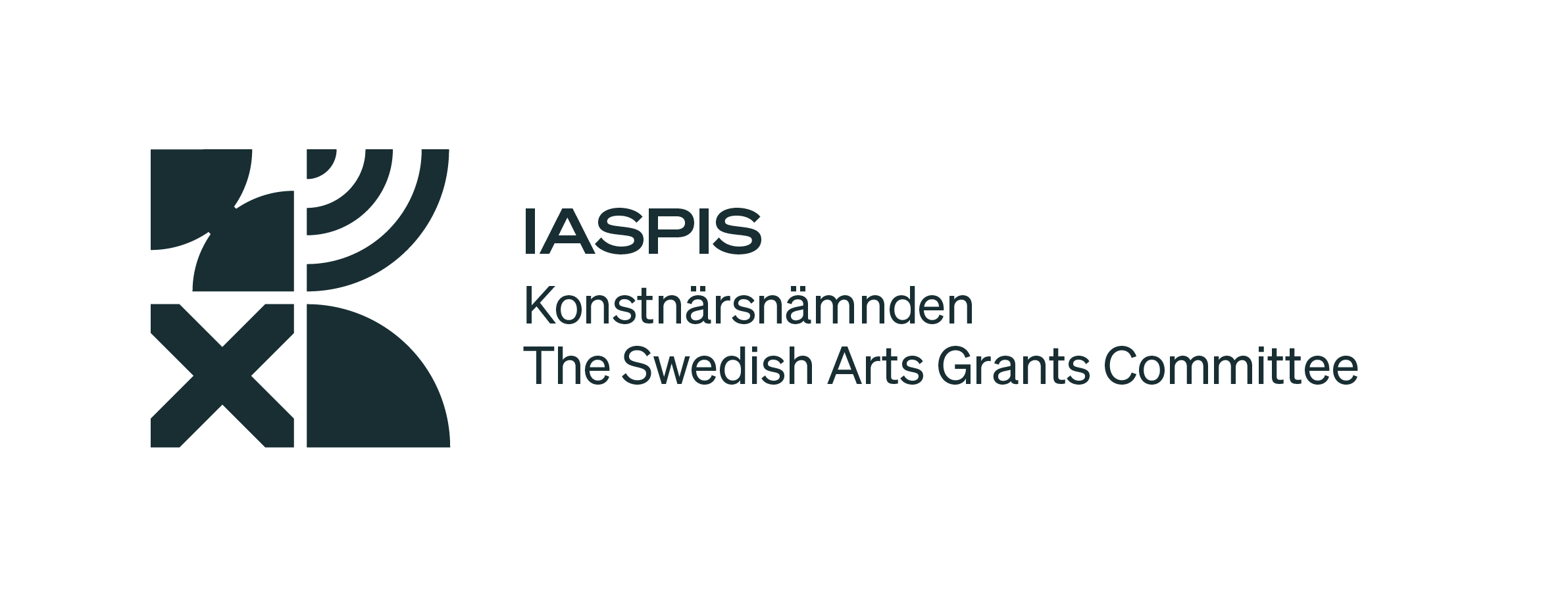PolyVocalCity: Ritual, routine and improvisation
Markas Fortunatas Klisius & Rebecca Sainsot-Reynolds
CATEGORY
“Cities break rituals, improvisations of fluidity, desire for shelter… and free rent”.
As Theatrum Mundi’s 8-month PolyVocalCity festival was coming to its fruitful finale, our cohort gathered around fragmented, stitched up and often incomplete maps of London, marking and highlighting different spaces of care, solidarity and resistance across the borough of Croydon and beyond.
Wrapped up and sheltered by the timber rooftop structure of Croydon’s nonconformist Quaker Hall, our participants, comrades and their friends collaged and assembled their own unique manifestations of these terms, reflecting upon the oral, aural and performative subjectivities of the spaces they chose to highlight. People’s conversations, pencils and accompanying mini printouts drifted from relationships formed across the chess boards in Ridley Road’s beloved Social Club to Lithuanian hairdressers in Beckton’s Retail Park, eventually gently returning back to the Whitgift Centre in Croydon, where these commonalities and solidarities blossomed in the first place.
For some these intricate notions of care and resistance were difficult to envision in the context of London, a city that is steadily becoming unlivable amidst multitudes of crises and deprecating living conditions. Layered on top of the dense London landscapes, the image of an Iroko tree in peoples’ ancestral village of Ikpoba-Okha near Benin City, or notes from walks during wellbeing retreats in Kent became external spaces of spiritual refuge, allowing people to process and imagine through the challenges that come with being in London, surviving the socio-economic disparity and hostility of prevailing neo-colonial conditions.
At the core of Theatrum Mundi’s Re-Staging Croydon programme was the necessity to collectively reflect upon these tensions, rethinking methodologies and vocabularies that we apply when thinking about Croydon’s current and future imaginaries. What does care and resistance look like in Croydon? Who can afford to be part of these imaginaries? What can we learn from what is already in place and what ultimately is architecture’s role (and its limitations) in shaping new networks and modes of knowledge exchange where care, interdependency and creativity are foundational to self-emancipation?
None of these terms are naturally effortless bedfellows for architectural practice; a practice concerned with the need to build, construct, compartmentalise, silo, anchor and fix. When we think about space-making and community building in Croydon, we analyse these processes in parallel to the processes of displacement, physical and social exclusion, inevitably forming and negotiating the micro-politics of urban spaces and subsequent community arrangements. We can think about heavy policing and displacement of migrant and racialised families, erasure of local businesses due to wider regeneration processes – in a borough where “container colonisation” [1] of the Boxpark structure sits next to disused buildings that lay empty despite the increasing collective homelessness, from houseless people to the many businesses and organisations in limbo over contractual lengths and the longevity of their physical spaces. Over the entirety of its existence, central Croydon has been continuously built up and torn down, revitalised and distorted, holding a thin paper over cracks that drowns out the emergence of new imaginaries.
Beneath and in-between these physical, cultural and economic boundaries, in the shadows of the menacing ‘Lunar House’ Home Office panopticon, the sociality and produced cultural resources, particularly within diasporic community spaces, serve as a foundation to renegotiate ownership of spaces they have been historically excluded from. Rituals, routines and improvisations that transpire on the neverending North End Quarter, or the Surrey Street market stalls hold together to form people’s day-to-day realities, agile and fluid, continuously in flux, in the process of making and reconstituting themselves. Despite the very fragile, often romanticised and ‘meanwhile’ constitution of these spaces, the knowledge exchange, visibility and care transpiring behind the glass walls of Turf Projects, beneath the heavy timber roof of the time travelling Quaker Adult School Hall, provide space and shape for alternative modes of gathering, storytelling, collective liberation and education, in search of livable and resilient futures.
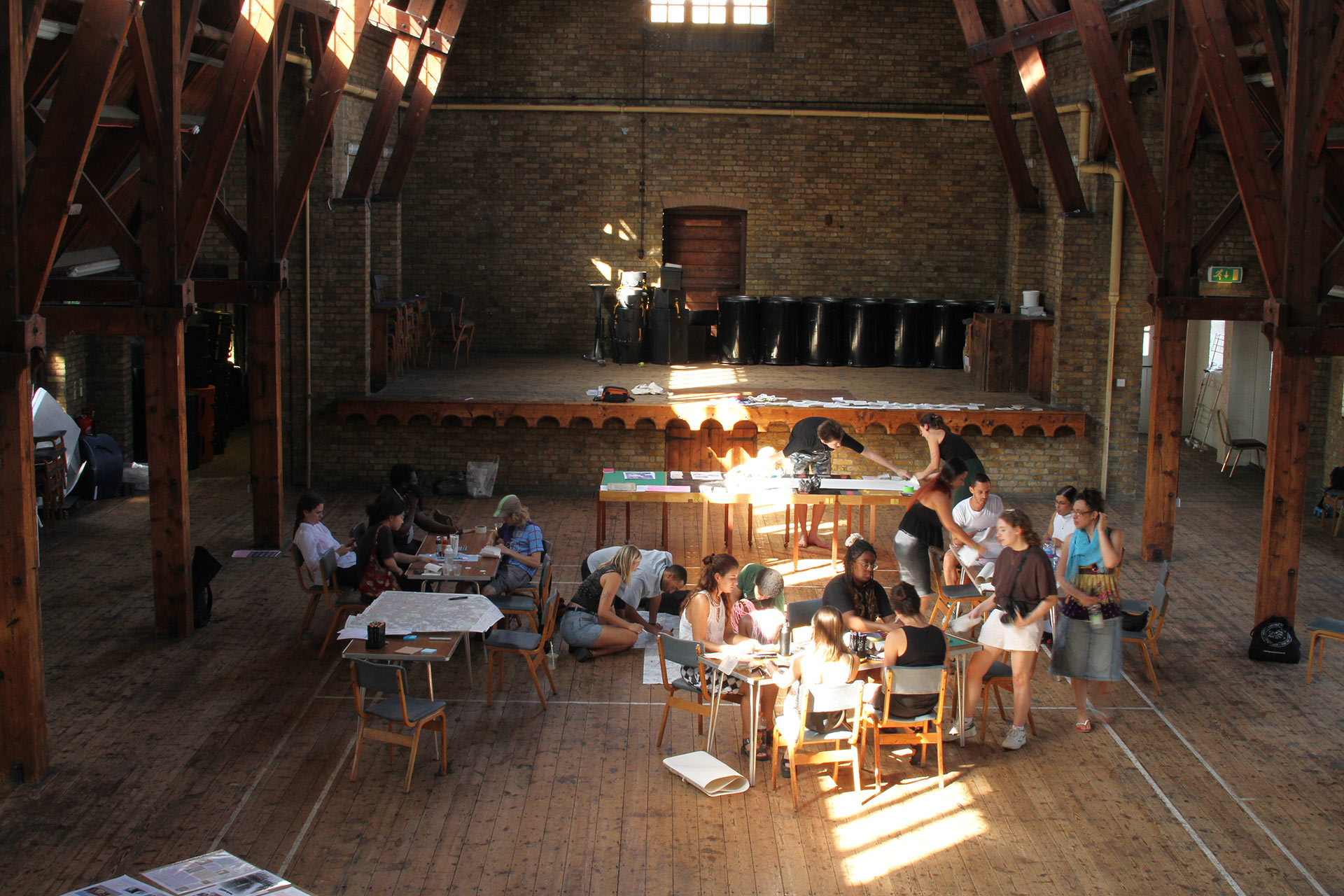
PolyVocalCity: Re-Staging Croydon’s cohort (2023). Image: courtesy of Theatrum Mundi
Croydon’s Quaker Adult School Hall, where we began this exploration, and its historical context in many ways serves as a metaphor for the borough’s tumultuous re-staging. Formed in parallel to extreme poverty, social deprivation and lack of accessible educational spaces that defined Croydon, the nonconformist church built the Adult Learning Hall to house Saturday Schools; young people; families; workers; conscientious objectors; space for shelter, gathering, worship and learning. In particular this building was conceived as a space in the once rural area, to house literacy and continued learning in a time when the school leaving age for the majority of the working and blue collar class was 12 years of age. The building in itself embodied total absence of applied finishes or set functionality, embracing the fluidity and ‘honesty of expression’ in all its components, prioritising equity and good living of its tenants. The building was erected in the once rural space of central Croydon using brick, timber, and iron. It’s only embellishment, the flowing wooden stage trimming. The materiality of it stands out amongst the glass, steel and concrete palimpsest of the 20th and 21st Centuries, tucked away slightly below road level opposite Fairfield Halls, adjacent to the Croydon Flyover.
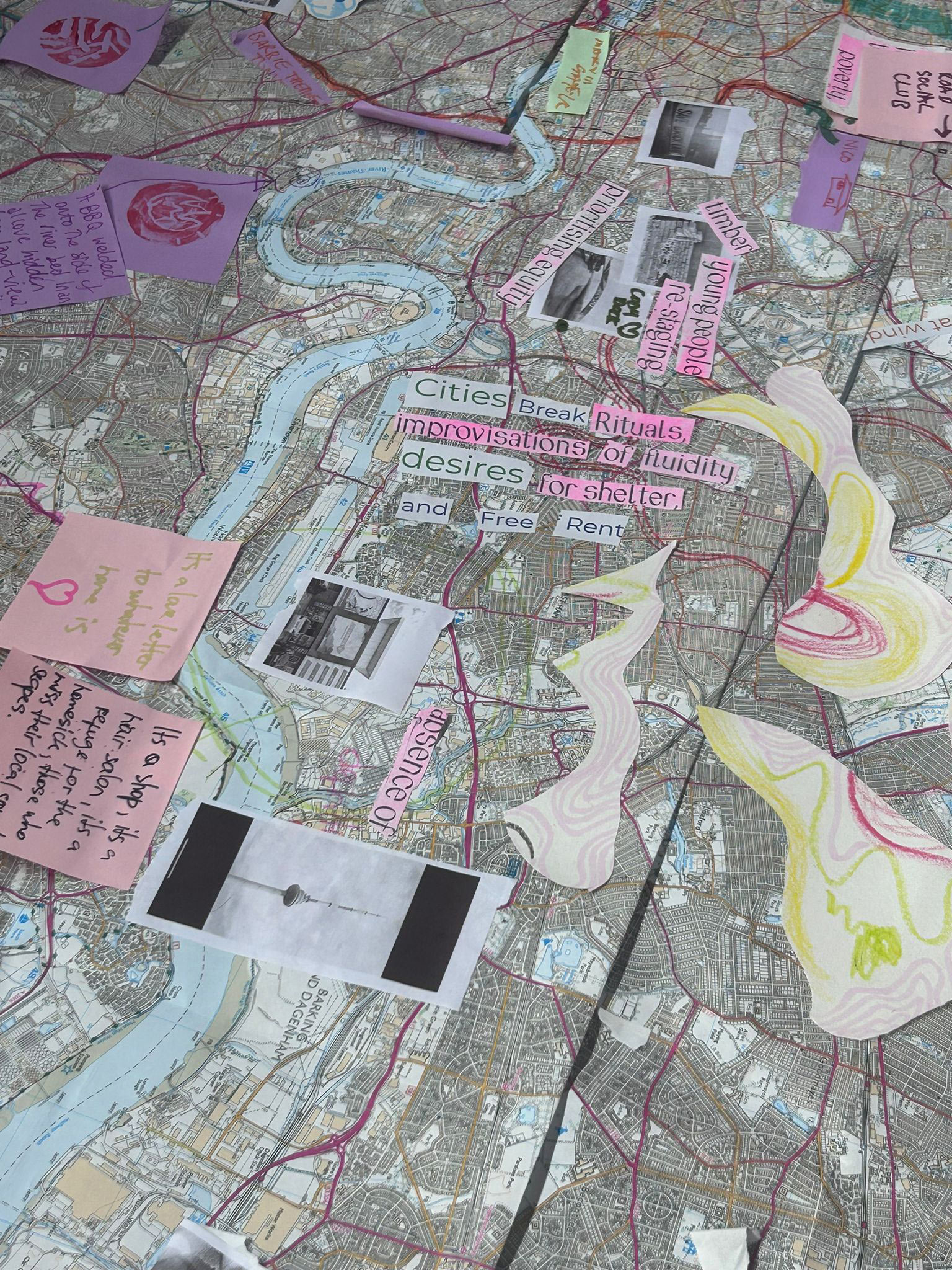
Image: PolyVocalCity: Re-Staging Croydon’s cohort (2023). Image: courtesy of Theatrum Mundi
Assembled in the format and spirit of a Saturday School, PolyVocalCity programme and its activities paid homage to the rich legacies of self-organised educational and alternative community-building spaces in the borough and beyond. In our various conversations with Gilian Turner, caretaker and avid historian of the Adult School Hall, the underlying ‘listening as an act of reaching out’ framework merged the core of principles of quakerism and ways Croydon’s quakers engage with the local communities they reside in. Whether in meeting for worship, conversing one to one, making decisions in community or sharing a quiet reflection – listening underpins the balance between faith and practical action, spiritual intimacy and collective organising. Listening here also posits a way of being present whilst creating space for others in a generous and tentative way, a way of being that is strikingly gentle and we felt offers a profound learning for planning and organising on every scale. The school hall in itself throughout the years has become a listening ear, extending itself into the social fabric of Croydon and rethinking its functionality to accommodate different modes of being – from hosting summer schools and educational programmes for children with learning difficulties, housing steel band rehearsals and instruments, hosting tai-chi sessions, and providing a nighttime kitchen and distribution locus for the charity Nightwatch who provide food for the local unhoused community.
Croydon’s Adult School Hall’s outreach and approach to education emerged as a temporary substitute to the practices of largely overpopulated and understaffed inner city schools, symptomatic of wider structural inequalities and systemic racism that underscore tensions across Britain. Such meaningful but often fleeting interventions within complex and poorly defined peripheries places emphasis on broadening our understanding of what education is and the diverse space where it can happen, what constitutes as valuable learning or ‘useful knowledge’ – “beyond the performative, beyond the orthodoxy, beyond the school (!) of thought”. [2]
Scale is important and some of these overarching questions and lived experiences informed the assemblage of the Homework Club hosted at the Turf Projects – a self-organised ‘Saturday School’ born from families living rooms, recently found an anchor in Turf Project’s gallery on Saturday mornings before opening hours. Initiated by Kyle Thomas, having grown up with his own Saturdays kept for self-directed learning, Homework Club, beyond the self-explanatory, can be a lot of different things. It is, firstly, a supplementary learning space that challenges and builds upon the general school curriculum, offering participating young people educational support, but also tools and skills tailored to their own learning needs. For 14 year old Makai, who was the resident sound engineer during our visit, it has been conquering the anxiety of public speaking and presenting, something that is hard to instil in the usual classroom of 30. For 12 year old Naya it is often maths with sprinkles of French, finding new words and textures to describe the world around them. Confidence, community and independent ownership of the learning journey and future ambitions being the overarching power of the Homework Club.
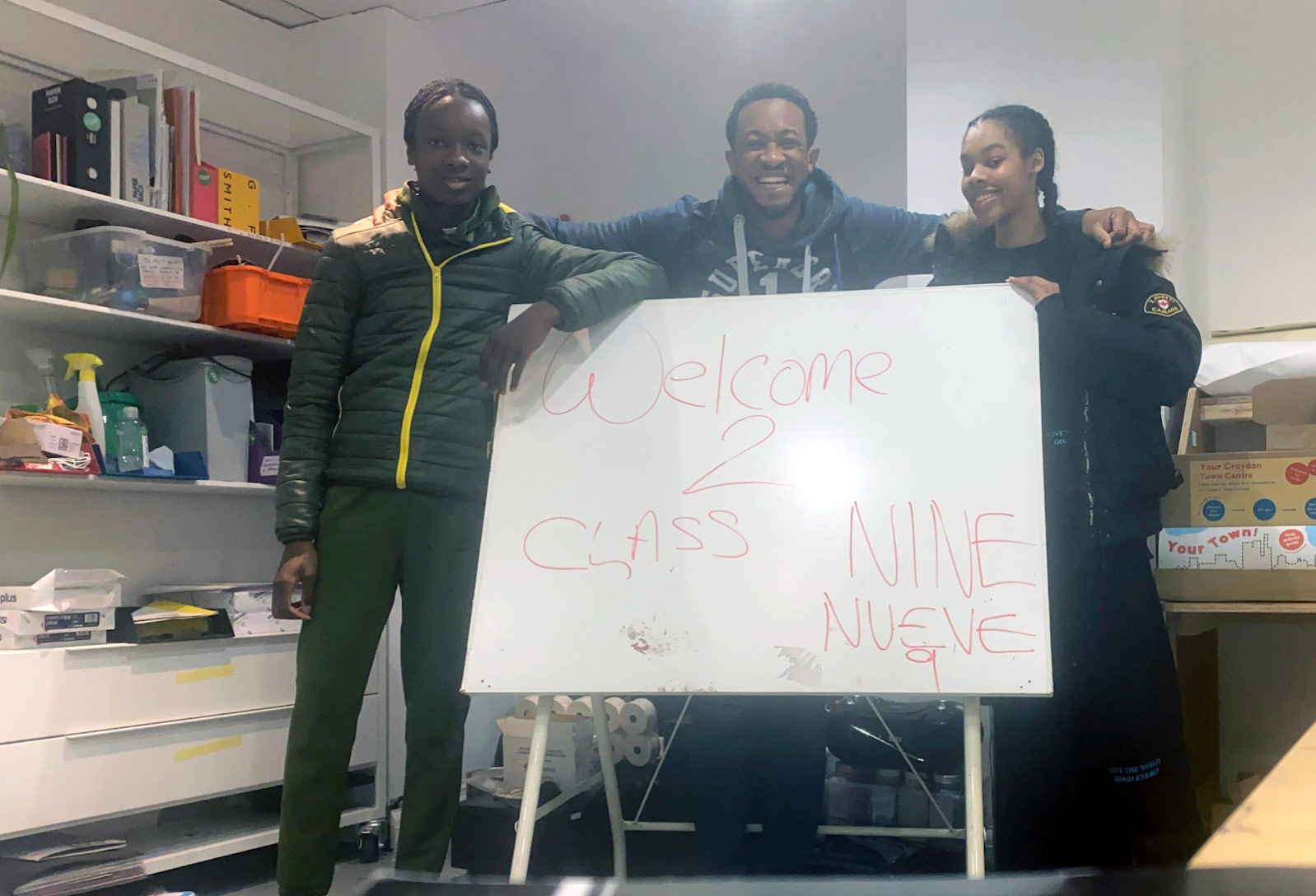
Homework Club hosted at the Turf Projects, run by Kyle Thomas. 2024. Image: courtesy of Markas Klissius
Having shifted from being purely online or in fellow residents’ flat – communal warmth and intimacy of the Turf Projects walls allows kids to share space, laugh, conquer mutual fears and just simply be. These sentiments were foundational to assembling this space in the first place with Kyle extending his experience, although dreaded at the time, of learning and growing into himself as a teenager through this extended attention to learning within his own home, and on weekends! Making mistakes, experimenting and exchanging learnt lessons defined Kyle’s expansive understanding of education and the Homework Club encapsulates these intentions, shaping building blocks for new ideas, career choices and friendships to flourish within and beyond the designated learning hours.
The collective ownership and agency in developing day-to-day activities is also crucial in rethinking how a school should operate, what knowledge is deemed as useful and how one can access it. “There is always a secret entrance through the school” said young Eden when retelling one of the Tom Gates’ ‘Spectacular School Trips’ stories – a metaphor of sorts that in different ways describes what Homework Club is to its community.
In journeying through the PolyVocal City program of 2023, holding time, treading pavements and finding new lenses to experience the borough and town of Croydon, in as much or as little of this as we could in this brief and focussed time, we also reached outward to Saturday Schools of different city spaces that come together for their own purposes. Red Sunday School in Glasgow follows the lineage of the Socialist Sunday School; secular alternatives to the mainstream education of the late 19th Century. On Sunday 28th January 2024, the Red Sunday School gathered for a session on Manifestos, seeking to explore and define their own working manifesto through workshops, play and shared lunch, as is their regular format.
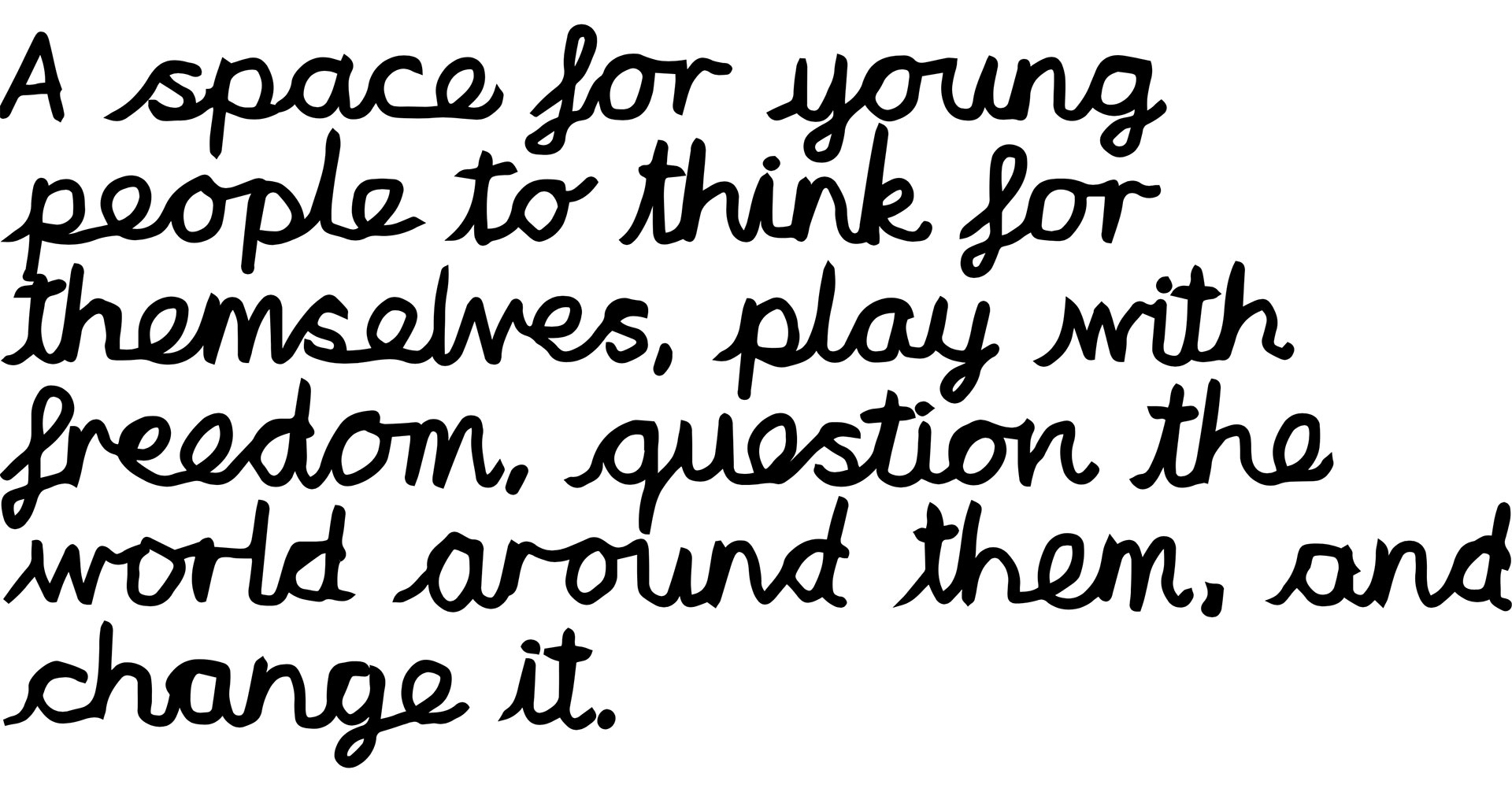
Text from the Red Sunday School. Image courtesy of the Red Sunday School
‘Organised on the principles of socialism and solidarity’ the Red Sunday School, situated in Glasgow’s Southside, offers an opportunity to approach the happenings of the world today with shared tools of radical perspective, active participation and the empowerment that comes from approaching environmental issues, society and culture together and in difference rather than in homogenous school environments that rush children through compacted learning experiences. Glasgow city has its own powerful history of activism to draw on, as a current Sanctuary City, the historical Rent Strikes of 1915, achieving the still active Rent Restrictions Act, to the 2021 Kenmure Street grassroots action that prevented a Home Office Eviction Raid [3], now affiliated with the slogan, ‘Solidarity Works’ on the water bottle merchandise of leftist news outlet Novara Media.
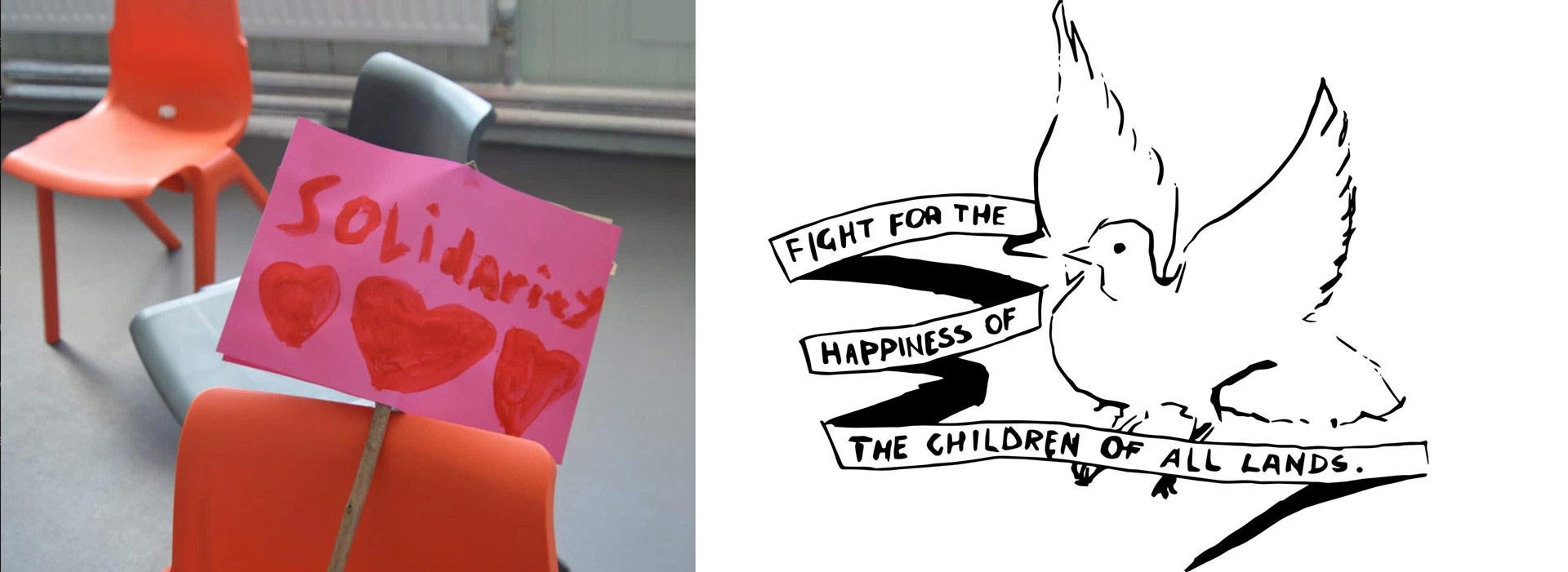
From the Red Sunday School. Image courtesy of the Red Sunday School
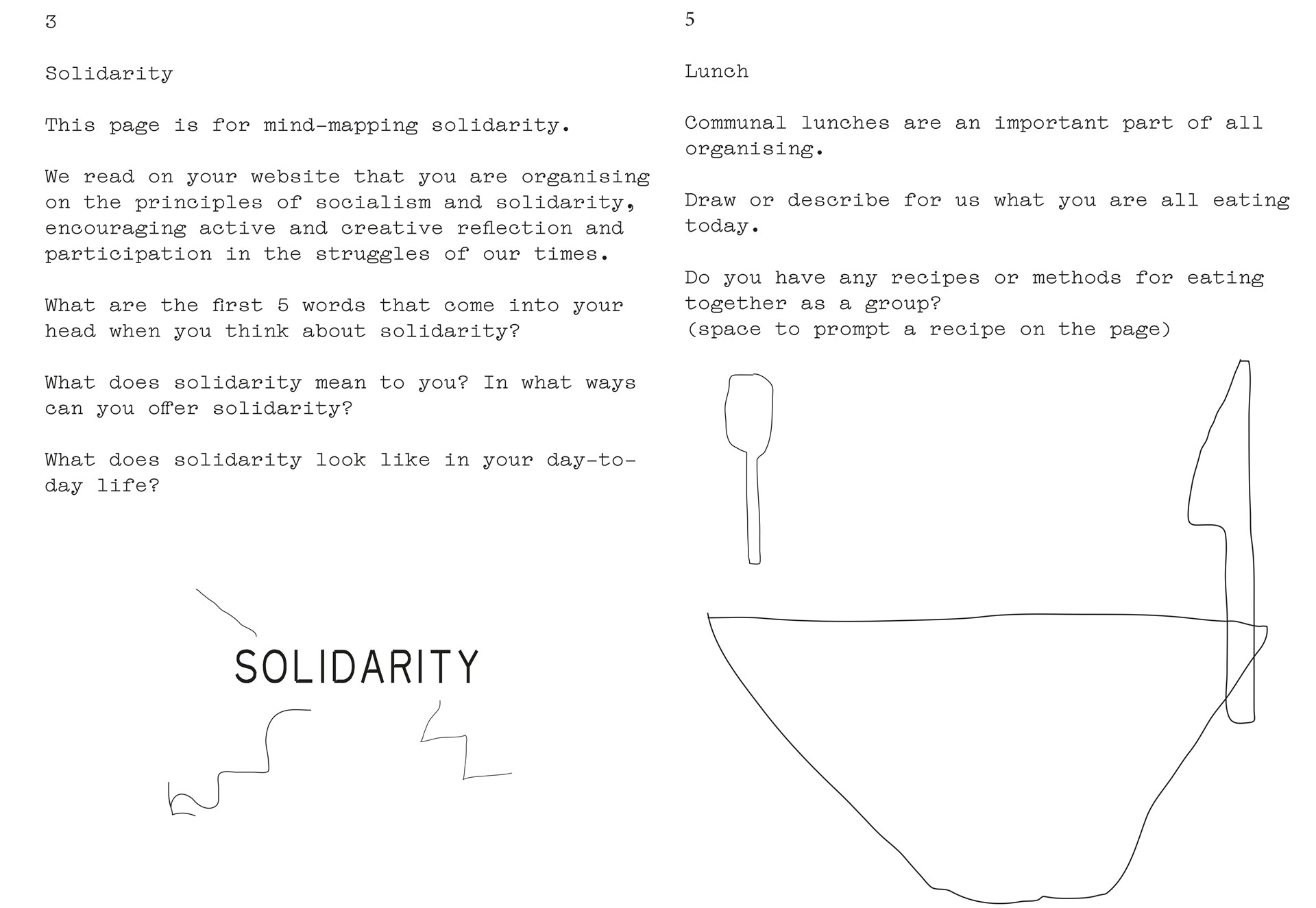
January’s Red Sunday School session centred around ‘Solidarity’. Images from The Red Sunday School workbook dialogue, ongoing. Image courtesy: The Red Sunday School
Thinking about what urban space can foster through these definitive but ethereal nouns, routine, ritual, and improvisation, shines a focus on qualitative human experiences and formations that are often physically untethered. Where are these things possible, and when we look at the examples available to us, why are they only able to find roots in the meanwhile, the informal, the fractures of city-spaces? Spaces that can exist generously[4], responding to need, desire, improvisation, solidarity and invitation without judgement and prerequisite; something of a living room, rooms for living. What the search for routine, ritual and improvisation returned, was a yearning for design and practise through tending reciprocity, “in hearing one another’s voices, in recognising one another’s presence”[5], (not putting it in a container box) for space and place that both listens and tells stories, without leering over us.
Looking outwards again to another ‘Saturday School’ in the constellation, Amilcar Cabral’s militant schools in colonial Guinea-Bissau, we find another way to look at (urban) landscape and the community action within; “people are the mountains”, according to Filipa Cesar, reveals the intimate interwovenness between the land and the people that occupy it as “the inscriptions on and in the palimpsest of the soil tell narratives of both the wretchedness and the liberatory potency of its humus”[6]. The materiality and ethos of these schools were shaped by the offerings of the land and peoples’ situated agricultural knowledge with soil becoming a blackboard for people to teach, imagine and form codes for resilient anti-colonial futures. The morphological flatness of the Guinean terrain, in Cabral’s eyes, also symbolised the non-hierarchical structure of the anti-colonial movement where education, humility and solidarity became weapons of militant struggle and gesture towards eventual liberation of their land.
“Socialism, thus, is not just about ending capitalism: it must go further into creating reflections and deeper consciousness through arts and culture. Revolutionary art and culture therefore undermines capitalism. Revolutionary art and culture criticise and educate; they reinforce collective effort, and decommodify art and culture, making them accessible to all.”[7]
Any consideration of refined vocabularies, pedagogies and strategies for environmental and social justice in Croydon’s urban realm must begin with Croydon’s own mountains – its people, and how to re-intwine the built environment with the reality of the human landscape which is reeling from developers pick ‘n’ mix, stop and start tactics to top down evolve Croydon into a business centre. Croydon can be likened to a piece of prose whose meaning unfolds as you go, over time and often in retrospect, where each reading is altered by the context in which it is read, and by whom. It is hard to approach it head-on as Croydon’s processes, narratives and meanings are not linear or concealed but rather emphasise the multiplicity of readings, positions and meaning, threading disparate imaginaries and experiences onto new surfaces to stand on. Croydon is a multifaceted living archive where cinemas become spaces of refuge for different diasporas; shopping centres become foundations for organising, music and memorial; spaces of worship become spaces of learning and care.
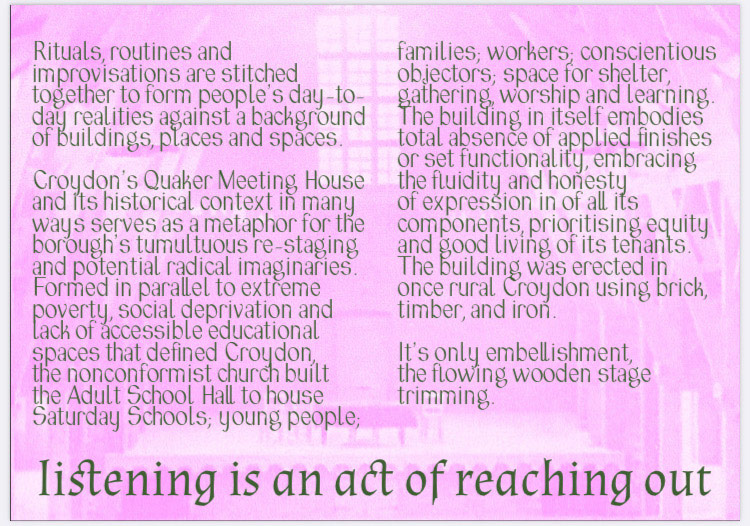
PolyVocalCity: Re-Staging Croydon’s, Saturday School Club (2023). Image: courtesy of Theatrum Mundi
Whether intentional from the beginning or not, the PolyVocalCity programme and its time in the borough remained faithful to the “not knowing”, in some ways becoming a form of anti-pedagogy in itself. Instead of compartmentalising experiences and collated reflections into concrete planning propositions, the programme found clarity in the unfamiliar, allowing space for curiosity, communal speculation and worldbuilding – imaginative and fantastical, at times apprehensive yet hopeful. As we gathered around the annotations extracted from our mapping exercise, we took prompts from Pauline Oliveros[8] methods of ‘sonic meditation’ and read these fleeting, disjointed but sincere offerings out loud – in a continuous flow, in an order that organically found itself. With hearing each other’s voices and the futile but powerful attempt to match cadence collectively, came the recognition of each other’s presence along with the extensive lineages of care and resistance that permeated the brick walls of the Quaker Hall, solidarities that inform the borough that gently hosted us – peculiar in its composition, at times disorienting, fluid and sprawling in its choreography, surreal and fragmented, suffocating for some, soothing for others.
This is a commission from Theatrum Mundi as Part of PolyVocalCity: Restaging Croydon. All copyright reserved to Theatrum Mundi and the artists. Funded by The City Bridge Trust and first published as part of Urgent Pedagogies Issue #10: PolyVocalCity
1.
Scafe-Smith, A. (2022) Questions not Answers. https://www.resolvecollective.com/questions-not-answers.
2.
Lambert, L. (2023) Schools of Revolution. The Funambulist.
3.
A Sea of Solidarity: The Standoff of Kenmure Street, May 18th 2021
4.
“True generosity lies in striving so that these hands — whether of individuals or entire peoples — need be extended less and less in supplication, so that more and more they become human hands which work and, working, transform the world”– Paulo Friere, 1970,The Pedagogy of the Oppressed.
5.
bell hooks, Teaching to Transgress: Education as the Practice of Freedom
6.
Cesar, F. (2018). Meteorisations: Reading Amilcar Cabral’s agronomy of liberation.
7.
The Thirty Height Newsletter, 2022. Without Culture, Freedom is impossible.
8.
Pauline Oliveros, Sonic Meditations
is a migrant researcher, educator, writer, and curator. Positioned at the intersection of migration studies, situated learning and architecture, their practice attempts to encapsulate the spatial, educational and technological parameters of infrastructural and systemic inequality, state violence and environmental transformations. Their academic background is in anthropological and curatorial studies, having received MA in Material and Visual Cultures at UCL and BA in Culture Criticism and Curation at CSM.
is an artist, educator and researcher working with site, story, play and object making processes through the lens of the work existing in the ‘being-together’. Unearthing stories through in depth investigations into the physical, historical, imagined and social histories of place and being. Rebecca delivers the young people’s programmes at Company Drinks in Barking, and is researching histories of urban play through work with Triangle Adventure Playground.
Norova Media: https://shop.novaramedia.com/products/solidarity-works-nalgene
A Sea of Solidarity: https://www.greatergovanhill.com/latest/a-sea-of-solidarity-the-standoff-on-kenmure-street
The Thirty Height Newsletter, 2022. Without Culture, Freedom is impossible. https://thetricontinental.org/newsletterissue/culture-cuba-decolonisation/
Adult School Hall, Croydon Quakers: https://f.croydonquakers.org.uk/ash/ashire.php
bell hooks, Teaching to Transgress: https://www.goodreads.com/book/show/27091.Teaching_to_Transgress?ref=nav_sb_ss_5_10
Derek R. Ford, Teaching the Actuality of the Revolution pdf: https://www.iskrabooks.org/teaching-the-actuality
Marxist Leninist Reading Club on the Amilcar Cabral School: https://www.mlreadinghub.org/articles/articles/the-amilcar-cabral-school
Pauline Oliveros, Listening as Activism: https://www.newyorker.com/culture/culture-desk/listening-as-activism-the-sonic-meditations-of-pauline-oliveros
Radical Education Workbook, by the Radical Education Forum: https://undercommoning.org/radical-education-workbook/
Red Sunday School: https://www.google.com/url?q=http://www.redsundayschool.org&sa=D&source=docs&ust=1713879460204151&usg=AOvVaw1XtNVE-V0buryxRYjF4Udx
Savedbythebell Hooks: https://www.instagram.com/savedbythebellhooks/
Turf Projects: https://turf-projects.com/
Workbook pdf. for dialogue with Red Sunday School: https://drive.google.com/file/d/1xmQ6Yv3897yN0Cs-LCKQQICnnZpqs0wg/view
